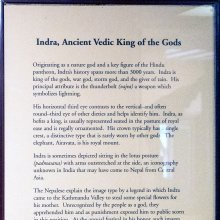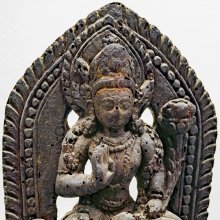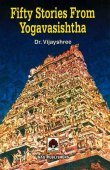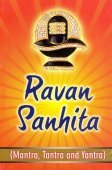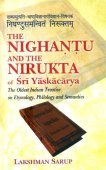Indra, Iṇḍra, Imdra: 60 definitions
Introduction:
Indra means something in Buddhism, Pali, Hinduism, Sanskrit, Jainism, Prakrit, the history of ancient India, Marathi, Hindi, biology. If you want to know the exact meaning, history, etymology or English translation of this term then check out the descriptions on this page. Add your comment or reference to a book if you want to contribute to this summary article.
Indra has 59 English definitions available.
Images (photo gallery)
(+36 more images available)
Languages of India and abroad
Sanskrit dictionary
[Deutsch Wörterbuch]
Source: Cologne Digital Sanskrit Dictionaries: Böhtlingk and Roth Grosses Petersburger WörterbuchIndra (इन्द्र):—
--- OR ---
Indra (इन्द्र):—
1) a) als Grammatiker [Oxforder Handschriften 175,b,1.] [Sp. 803, Z. 21 lies 38,16 Stenzler 18,36.] — b) makhendreṇa rājasūyena [Bhāgavatapurāṇa 10, 70, 41.] —
3) f. ī Nomen proprium eines Wesens im Gefolge der Devī [WILSON, Sel. Works 2, 39.]
--- OR ---
Indra (इन्द्र):—
1) a) [Sp. 803, Z. 3] füge [?10, 73, 1 nach 8, 66, 1. 2 hinzu. Z. 21] lies [Vājasaneyisaṃhitā 38, 16.] Als Bez. der Zahl vierzehn [Sūryasiddhānta 2, 53.]
Source: Cologne Digital Sanskrit Dictionaries: Sanskrit-Wörterbuch in kürzerer FassungIndra (इन्द्र):—(im [Ṛgveda (roth). ] auch dreisilbig) —
1) m. — a) Nomen proprium des nationalen Gottes der arisch-indischen Stämme , der mit seinem Donnerkeil im Gewitter die dämonischen Gewalten bekämpft. Er ist das Haupt der Götterwelt und Hüter des Ostens. indratama Indra in höchster Potenz. — b) am Ende eines Comp. der Erste in seiner Art , Fürst , Oberster (von Belebtem und Unbelebtem). — c) das auf dem Stern des rechten Auges sich spiegelnde Bildchen. — d) Bez. der Zahl vierzehn (14 Manvantra und 14 Indra). — e) der Stern γ Pegasi. — f) ein best. astrol. Yoga. — g) *Seele. — h) *Nacht. — i) *ein best. vegetabilisches Gift Auch *f. — k) Nomen proprium — α) eines Āditya. — β) eines Grammatikers. — γ) eines Arztes. — δ) *eines Upadvīpa. —
2) *f. ā — a) Indra’s Gattin. — b) Koloquinthengurke [Nighaṇṭuprakāśa (roth) ] —
3) f. ī Nomen proprium eines Wesens im Gefolge der Devī.
Sanskrit, also spelled संस्कृतम् (saṃskṛtam), is an ancient language of India commonly seen as the grandmother of the Indo-European language family (even English!). Closely allied with Prakrit and Pali, Sanskrit is more exhaustive in both grammar and terms and has the most extensive collection of literature in the world, greatly surpassing its sister-languages Greek and Latin.
See also (Relevant definitions)
Starts with (+418): Imdrabhisheka, Imdradikku, Imdradiktata, Imdragoce, Imdrajaliga, Imdrajaligatana, Imdrajavi, Imdrajevi, Imdrakale, Imdramani, Imdramgane, Imdranaga, Imdranike, Imdranilaya, Imdranokaha, Imdrasarittu, Imdrashe, Imdrashudra, Imdrasimdhu, Imdrasimdhura.
Ends with (+176): Acalendra, Adrindra, Agneyaindra, Agnindra, Ahamindra, Ahindra, Aindra, Akshindra, Amarananda yogindra, Amarendra, Anaindra, Anandanatha mallikarjuna yogindra, Anandapurna munindra, Anindra, Aranimdra, Ardhendra, Asurendra, Atindra, Avanindra, Balagopalayatindra.
Full-text (+4563): Shakra, Inda, Upendra, Saci, Purandara, Indrayudha, Mahendra, Matali, Aindra, Pakashasana, Indrari, Indrani, Amaravati, Airavana, Shacipati, Akhandala, Vajrin, Indrashatru, Shunashira, Indrasoma.
Relevant text
Search found 309 books and stories containing Indra, Imdra, Iṃdra, Iṇḍra, Indrā; (plurals include: Indras, Imdras, Iṃdras, Iṇḍras, Indrās). You can also click to the full overview containing English textual excerpts. Below are direct links for the most relevant articles:
Rig Veda (translation and commentary) (by H. H. Wilson)
Bhagavati-sutra (Viyaha-pannatti) (by K. C. Lalwani)
Part 2 - Family of Valīndra < [Chapter 5]
Part 13 - Attitude of two Indras towards each other < [Chapter 1]
Chapter 8: Indras < [Book 3]
Women in the Atharva-veda Samhita (by Pranab Jyoti Kalita)
8. Goddess Ekāṣṭakā < [Chapter 4 - Female Deities and the Glorification of Women in the Atharvaveda]
6. Goddess Āsurī < [Chapter 4 - Female Deities and the Glorification of Women in the Atharvaveda]
22. Goddess Sītā < [Chapter 4 - Female Deities and the Glorification of Women in the Atharvaveda]
Sahitya-kaumudi by Baladeva Vidyabhushana (by Gaurapada Dāsa)
Text 9.47 < [Chapter 9 - Ornaments of Sound]
Text 2.15 < [Chapter 2 - The Natures of Words (śabda)]
Text 10.68 < [Chapter 10 - Ornaments of Meaning]
Chaitanya Bhagavata (by Bhumipati Dāsa)
Verse 2.25.1 < [Chapter 25 - The Discourse on Spiritual Knowledge by Śrīvāsa’s Dead Son]
Verse 3.5.611 < [Chapter 5 - The Pastimes of Nityānanda]
Verse 3.9.62 < [Chapter 9 - The Glories of Advaita]
Mahabharata (English) (by Kisari Mohan Ganguli)
Section CLXLIX < [Vaivahika Parva]
Section XXV < [Arjunabhigamana Parva]
Section CLXX < [Uluka Dutagamana Parva]
Related products
(+7 more products available)
